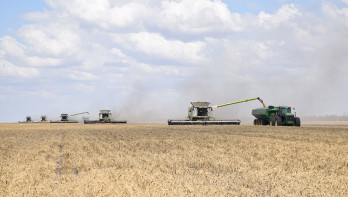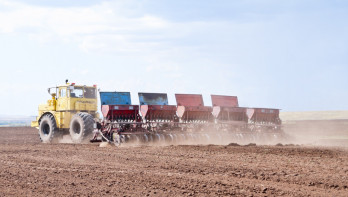Analysis Grains
Export becomes a bottleneck in the grain market
Growing grain is fun, but it is important that it reaches the buyers. That is not easy. In the EU, wheat exports are lagging behind last season. In Ukraine, exports are doing better than last season. However, farmers there are worried about a planned increase in rail tariffs. In Canada, access for grain exporters to the Asian market is limited due to a major strike at the port of Vancouver.
The December contract for wheat on the Matif closed €1.50 lower at €218.75 per ton yesterday. On the CBoT, wheat closed 0.8% lower at $5.78 per bushel. Corn also took a step back, dropping 0.4% to $4.11¾ per bushel. Soybeans closed 3 cents higher at $10.42¼ per bushel.
By September 22, the EU had exported 5.86 million tons of wheat this season. Last season, 7.67 million tons were exported by the same time. The export shortfall has increased slightly compared to last week, from 23% to 24%. More soybeans and corn have been imported this season. The EU imported 4.72 million tons of corn compared to 4.23 million tons last season, and 2.81 million tons of soybeans compared to 2.73 million tons last season.
In Ukraine, grain exports are better than last season. The Ukrainian Ministry of Agriculture announced today that 9.76 million tons of grain and oilseeds have been exported by September 25 this season. Last year, the total at this time was 6.15 million tons.
Cost Increase
Among Ukrainian grain farmers, there is unrest over plans to increase rail transport tariffs. The state-owned Ukrainian Railways Ukrzaliznytsia wants to raise freight rates by 7%. According to the Ukrainian Agrarian Confederation UCAB, the rate increase for farmers is much higher. The proposed rates would make the transport of empty wagons 67% more expensive. "The costs for grain transport would increase by 50 to 60 hryvnia (approximately €1 to €1.30) per ton. This is an additional cost of up to 2 billion hryvnia (approximately €44 million) per season for Ukrainian grain farmers," said UCAB in a statement. Due to the war and the sharply decreased grain prices, Ukrainian farmers are already facing difficulties according to UCAB. By making rail transport more expensive, farmers will face further problems, potentially leading to a decline in grain production and exports.
Strike
Canada is also facing logistics issues. Yesterday, employees of the six major grain terminals at the port of Vancouver went on strike. Salary negotiations between the unions and employers had stalled last week. Canada is the largest exporter of canola and a significant exporter of wheat. According to the Canola Council of Canada, the strike could have significant financial consequences if unions and employers do not reach an agreement quickly.
The timing of the strike is unfortunate for Canadian farmers. The grain harvest is still ongoing in Canada, and yields are generally good. Therefore, farmers and traders need to quickly market a portion of the harvest on the global market. Vancouver is the main port for exports to Asia. Some can be shipped through ports in the US. If the strike lasts a few weeks, the market impact will be limited according to traders. However, if the strike continues, it could depress prices for wheat and canola in the North American market according to experts.




